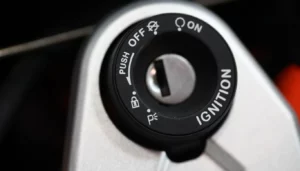Car batteries power the ignition, lights, and electrical systems. Acting as a rechargeable power source, it uses chemical reactions to generate voltage that propels your vehicle’s engine into action.
Simply put, a car battery supplies the electrical current that starts the car’s engine, and also powers all of the electrical accessories when the engine isn’t running. Your car’s lights, windscreen wipers, power windows, radio, and air conditioning wouldn’t work without a battery.
What Powers a Car Battery?
Lead and sulfuric acid provide electricity in automobile batteries. The starter motor, ignition, and fuel systems, which start the car, are powered by this stored electricity.
Types of Car Batteries
Car batteries have diverse features, benefits, and lifespans.
Lead-Acid Batteries
The most common type of car battery, these are affordable and reliable. They use a simple, time-tested technology: a chemical reaction between lead plates and sulfuric acid electrolyte.
Absorbed Glass Mat (AGM) Batteries
AGM batteries are a type of lead-acid battery, but with a twist. They have glass mats that absorb the electrolyte, making them more resistant to vibration, with a longer lifespan and higher efficiency.
Lithium-ion Batteries
These batteries are often found in electric cars and hybrids. They’re more expensive than lead-acid batteries but lighter and more efficient.
Deep Cycle Batteries
These are designed for vehicles that need a lot of power over a longer period, such as golf carts or marine applications. They’re built to be discharged and recharged many times without damaging the battery.
Comparative Overview of Different Battery Types
Your car, driving habits, and budget determine the optimum battery type.
Understanding the Lifespan of a Car Battery
Car batteries’ lifespans depend on their type, operating conditions, and maintenance.
Average Lifespan of Different Types of Batteries
Lead-acid batteries generally last 3-5 years. AGM batteries can last 4-6 years with proper care. In ideal conditions, lithium-ion batteries last 8-10 years, but deep cycle batteries’ lifespans vary.
Factors Influencing a Car Battery’s Lifespan
A car battery’s lifespan depends on driving patterns, environment, electrical consumption, and maintenance.
Factors Affecting the Lifespan of Car Batteries
Several factors can significantly influence the longevity of a car battery. Here are the most notable ones:
Driving Conditions and Habits
Your driving habits significantly affect your car battery’s lifespan. Frequent short trips, especially in cold weather, can shorten it because the battery doesn’t have enough time to fully recharge between trips.
Weather and Climate Factors
Car batteries can die under extreme temperatures. Cold temperatures make the engine difficult to start, straining the battery, while high temperatures speed up the chemical reaction inside the battery, shortening its lifespan.
Car’s Electrical Demand
Using a lot of electrical accessories, especially when the engine isn’t running, can drain a car battery quickly. Battery longevity might be shortened by frequent draining and undercharging.
Maintenance and Care
Regular maintenance can significantly extend a car battery’s lifespan. This includes keeping the battery clean, making sure it’s securely mounted to prevent vibration, and regularly checking the battery’s charge and topping up the electrolyte if necessary.
Signs of a Dying Car Battery
Being able to identify the signs of a dying car battery can save you from unexpected breakdowns. Here are some telltale signs:
Slow Engine Crank
The engine cranks slowly and takes longer to start.
Warning Lights on the Dashboard
The check engine light sometimes appears when your battery power is weak. Another more obvious sign that your battery is weak is the battery warning light on the dashboard.
Swollen Battery Case
If your battery case is swollen or bloated, it’s a sign that your battery may be about to fail. This can be caused by excessive heat.
Frequent Jump Starts
If you need to jump-start your car a lot, it’s a clear sign your battery may be failing.
Extending Your Car Battery’s Lifespan
Car batteries can last longer with appropriate care. Here are some tips:
Regular Maintenance and Inspection
Keep the battery clean and free of corrosion, and ensure the connections are tight. Have it inspected regularly by a professional.
Managing Your Car’s Electrical Load
Try to minimize the use of electrical accessories when the engine isn’t running to avoid draining the battery.
Appropriate Storage During Extended Non-use
If you’re not driving for a while, use a battery maintainer.
Adapting to Weather Conditions
In hot climates, park your car in the shade or a garage. In cold climates, consider a battery warmer.
The Process of Changing Your Car Battery
Replacing car batteries is straightforward if you know how. However, incorrect handling can lead to accidents. Safety should be a priority.
When Should You Change Your Battery?
Ideally, replace your car battery every 3-5 years. However, if you notice any of the signs of a failing battery mentioned earlier, consider changing it sooner.
Step-by-Step Car Battery Change
Steps vary by car, but they include:
- Turn off the engine.
- Remove the negative cable first, then the negative cable (typically black or marked with a minus sign) (usually red or marked with a plus sign).
- Remove the old battery.
- Clean the battery tray and cable connectors.
- Insert the new battery, and reconnect the positive cable first, then the negative cable.
- Make sure the battery is secured, and the connections are tight.
Always follow your vehicle manufacturer’s instructions when changing your car battery, and use protective gear to avoid injuries.
Safety Measures to Consider While Changing Batteries
It’s essential to ensure safety when changing your car battery. Always wear protective gloves and glasses, and avoid smoking or open flames near the battery. Also, dispose of the old battery properly.
Proper Disposal of Old Car Batteries
Disposing of car batteries improperly can pollute the environment.
Environmental Impact of Incorrect Battery Disposal
If thrown into the regular trash, car batteries can end up in landfills, where they can leak toxic chemicals into the ground. These chemicals can contaminate water sources and harm wildlife.
Methods and Places to Dispose of Car Batteries
Recycle, scrap metal, or auto parts stores will accept your old automobile battery. Many of them accept old car batteries and dispose of them properly.
Battery Recycling Programs
Many regions have battery recycling programs that take old car batteries. Some auto parts stores even offer a discount on your new battery when you bring in your old one for recycling.
Frequently Asked Questions
Why does my car battery keep dying?
Several factors can cause your car battery to keep dying, including leaving your lights on when the engine is off, poor electrical connections, extreme temperatures, old age, or an issue with the charging system.
How can I check my car battery’s health?
A multimeter or a professional can test your automobile battery’s voltage.
How can I jump-start my car battery safely?
You’ll need another car with a working battery and a set of jump leads. Attach the dead battery’s positive terminal to the good battery’s positive terminal, then the negative terminals. Start the working car, then try to start the car with the dead battery.
Can a car battery be recharged? If yes, how?
A car battery can be recharged by driving for at least 30 minutes. If the car won’t start, use a wall-plug battery charger.
Can a car battery drain if not used for a long time?
Yes, car batteries can drain if not used for a long time. If you won’t drive for weeks, disconnect the battery or use a battery maintainer.
Conclusion
Any car needs a battery. Every car owner has to know how long car batteries last, how to extend their lifespan, and how to replace them when they die. Maintaining, using, and replacing your battery regularly will prevent unexpected failures and keep your vehicle running smoothly.






